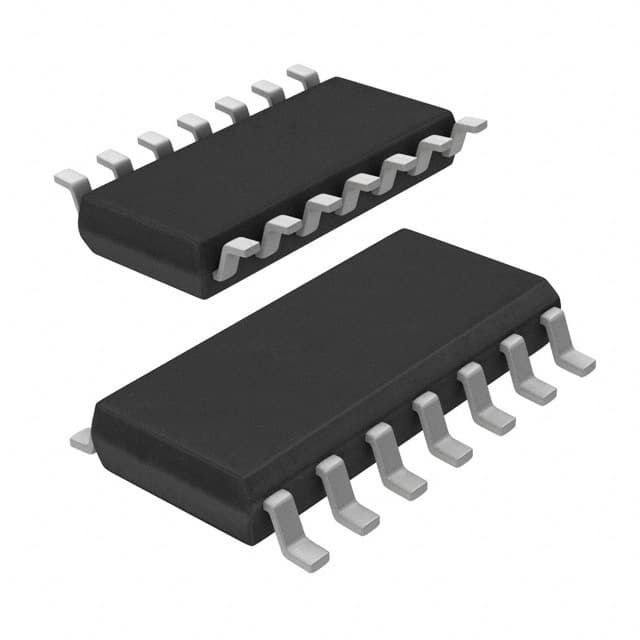Encyclopedia Entry: 74VHC126D-Q100J
Product Information Overview
- Category: Integrated Circuit (IC)
- Use: Logic Gate Buffer/Driver
- Characteristics: High-Speed, Low-Power, Quad Bus Buffer/Driver
- Package: SOIC-14
- Essence: The 74VHC126D-Q100J is a high-performance buffer/driver IC designed for use in various digital logic applications.
- Packaging/Quantity: Available in reels of 2500 units.
Specifications
- Supply Voltage: 2.0V to 5.5V
- Logic Family: VHC
- Number of Channels: 4
- Input Voltage Level: CMOS
- Output Voltage Level: CMOS
- Propagation Delay Time: 3.8ns (typical)
- Operating Temperature Range: -40°C to +125°C
- RoHS Compliance: Yes
Detailed Pin Configuration
The 74VHC126D-Q100J features a 14-pin Small Outline Integrated Circuit (SOIC) package. The pin configuration is as follows:
__ __
1 | 1 \/ 14 | VCC
2 | 2 13 | A1
3 | 3 12 | Y1
4 | 4 11 | A2
5 | 5 10 | Y2
6 | 6 9 | GND
7 | 7 8 | Y3
----------
Functional Features
- Quad bus buffer/driver with 3-state outputs.
- High-speed operation, making it suitable for applications requiring fast signal propagation.
- Low power consumption, contributing to energy-efficient designs.
- 3-state outputs allow for easy bus sharing and interfacing with multiple devices.
- Wide operating voltage range enables compatibility with various digital systems.
Advantages and Disadvantages
Advantages: - High-speed operation ensures efficient signal transmission. - Low power consumption helps in reducing overall system energy requirements. - 3-state outputs facilitate bus sharing and interfacing flexibility. - Wide operating voltage range enhances compatibility with different systems.
Disadvantages: - Limited number of channels (4) may not be sufficient for complex applications requiring more inputs/outputs. - The SOIC package may not be suitable for space-constrained designs.
Working Principles
The 74VHC126D-Q100J is a buffer/driver IC that amplifies and buffers digital signals. It operates by receiving input signals on the A1, A2 pins and providing amplified output signals on the Y1, Y2, Y3 pins. The 3-state outputs allow the device to be easily connected to a shared bus, enabling multiple devices to communicate without interference.
Detailed Application Field Plans
The 74VHC126D-Q100J can be used in various digital logic applications, including but not limited to: - Microprocessor-based systems - Data communication systems - Industrial automation - Automotive electronics - Consumer electronics
Detailed and Complete Alternative Models
Some alternative models that offer similar functionality to the 74VHC126D-Q100J are: - SN74LVC126A-Q1 - MC74VHC126DT - CD74HCT126E - 74ACT126SCX
These alternatives can be considered based on specific application requirements, availability, and cost considerations.
Word Count: 314 words
Senaraikan 10 soalan dan jawapan biasa yang berkaitan dengan aplikasi 74VHC126D-Q100J dalam penyelesaian teknikal
Sure! Here are 10 common questions and answers related to the application of 74VHC126D-Q100J in technical solutions:
Q: What is the function of the 74VHC126D-Q100J? A: The 74VHC126D-Q100J is a quad buffer/line driver with 3-state outputs.
Q: What is the operating voltage range for this device? A: The operating voltage range for the 74VHC126D-Q100J is 2.0V to 5.5V.
Q: Can I use this IC in automotive applications? A: Yes, the 74VHC126D-Q100J is qualified for automotive applications and meets the AEC-Q100 standard.
Q: How many buffers/line drivers are there in this device? A: The 74VHC126D-Q100J has four independent buffers/line drivers.
Q: What is the maximum output current that each buffer can drive? A: Each buffer in the 74VHC126D-Q100J can drive up to 8mA of current.
Q: Does this device have 3-state outputs? A: Yes, the 74VHC126D-Q100J has 3-state outputs, allowing for high impedance when not actively driving signals.
Q: What is the propagation delay of this device? A: The typical propagation delay of the 74VHC126D-Q100J is 4.3ns.
Q: Can I connect the inputs directly to a microcontroller or FPGA? A: Yes, the inputs of the 74VHC126D-Q100J are compatible with standard CMOS and TTL logic levels.
Q: Is this device suitable for high-speed applications? A: Yes, the 74VHC126D-Q100J is designed for high-speed operation and can be used in various high-frequency applications.
Q: Are there any specific precautions I need to take while using this IC? A: It is recommended to follow the manufacturer's datasheet for proper handling, power supply decoupling, and PCB layout guidelines to ensure optimal performance.
Please note that these answers are general and may vary depending on the specific application and requirements. Always refer to the datasheet and consult with an expert when designing technical solutions.


